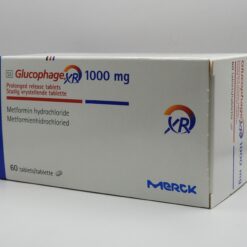
Bio-glibenclamide (5mg tablet x 500)
$44.20
Bio-glibenclamide is a medication available in the form of a 5mg tablet. It belongs to a class of drugs known as sulfonylureas and is commonly used to manage high blood sugar levels in individuals with type 2 diabetes. By stimulating the release of insulin from the pancreas, bio-glibenclamide helps lower blood glucose levels and improve glycemic control. It is typically prescribed as part of a comprehensive treatment plan that includes dietary modifications and regular exercise. As with any medication, it is important to follow the prescribed dosage and consult a healthcare professional for personalized guidance and monitoring.
glibenclamide (also known as glyburide), which is an oral antidiabetic medication used to treat type 2 diabetes. I’ll provide you with a general description and dosage information for glibenclamide based on that assumption:
Description:
Glibenclamide (glyburide) belongs to a class of medications called sulfonylureas. It works by stimulating the pancreas to produce more insulin and by helping the body use insulin more effectively. Glibenclamide is used in the management of type 2 diabetes to help control blood sugar levels.
Dosage and Administration:
Glibenclamide is available in various strengths, including 5 mg tablets. The dosage may vary depending on individual factors, such as the severity of diabetes, response to treatment, and other medications being taken. It is crucial to follow your doctor’s instructions regarding the dosage and usage of glibenclamide.
Typically, the starting dose for glibenclamide is 2.5 to 5 mg once daily with breakfast or the first main meal of the day. Your doctor may adjust the dosage based on your blood sugar levels, aiming to maintain them within the target range. The maximum recommended daily dose is generally 20 mg.
It is important to take glibenclamide regularly and at the same time each day to achieve the best results. Swallow the tablet whole with water and do not crush or chew it unless specifically instructed by your doctor.
Usage and Precautions:
Glibenclamide is typically prescribed as part of a comprehensive diabetes management plan that includes a balanced diet, regular exercise, and weight control. It is essential to closely monitor your blood sugar levels during treatment and follow up with your healthcare provider regularly.
Here are some important points to consider while using glibenclamide:
- Follow your doctor’s instructions and take the medication as prescribed.
- Monitor your blood sugar levels regularly as directed by your doctor.
- Notify your doctor if your blood sugar levels remain high or if you experience any unusual symptoms.
- Be aware of the signs of low blood sugar (hypoglycemia), such as dizziness, sweating, shaking, confusion, and rapid heartbeat. Carry a source of glucose (e.g., glucose tablets, candies) in case of a hypoglycemic episode.
- Inform your doctor about any other medications you are taking, as some drugs may interact with glibenclamide and affect its effectiveness or increase the risk of side effects.
- Discuss with your doctor if you are pregnant, planning to become pregnant, or breastfeeding, as the use of glibenclamide may need to be adjusted during these periods.
Please note that the information provided here is a general overview and should not replace the specific instructions and guidance provided by your healthcare provider. If you have any questions or concerns about your medication, dosage, or usage, it’s best to consult with your doctor or pharmacist for personalized advice.
| Weight | 0.06 kg |
|---|---|
| Dimensions | 3 × 3 × 1 cm |
Related products


